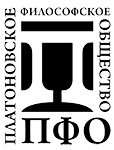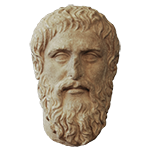There is a tendency to associate with Plato theoretical discussions on the theory of forms, immortality of the soul and other themes of late dialogues, while elenchos, maieutics and learned ignorance are pointing towards Socratic practice of philosophy. Yet Plato’s Phaedo is a special case of how practice and theory of philosophy are interrelated. The task to give an account for ‘two pillars of Platonism’, as F. Cornford called the theory of forms and the doctrine of the immortality of the soul, goes hand in hand with the task to advocate for a philosophical way of life, which is the focus of the so-called ‘second’ apology of Socrates and the third proof of immortality of the soul. Those who live this way of life are called ‘true philosophers’ in the dialogue.
What is the way of life of a true philosopher? His primary concern is dying, given that death is a separation of the soul from the body. He is characterized by a special attitude towards bodily pleasures: by avoiding them, he directs his care entirely to the soul. Vision, hearing can also deceive the soul. A strict regime of pleasures and suspicion towards sensations are necessary for a true philosopher to practice the ability to think. The object of thinking is something that cannot be found in the senses, only by the soul, not by the body. But as long as the soul is in the body, it is impossible for the soul to be released completely. Therefore, full knowledge is only attainable after death. Until then, the true philosopher must strive for the separation of the soul, which is the essence of philosophical practice. In the third argument, Socrates returns to the idea that philosophy, as a practice of separation of soul from body and concentration of soul in itself, is a preparation for death (μελέτη θανάτου).
From this we could conclude that Phaedo is a distinctive manifesto of asceticism. It is believed that the view of ‘true philosophers’ was influenced by Pythagorean ideas of the strict regime that applied to the body. But to what extent can we say that Plato or Socrates shared these ideas? There are some of the most common interpretations. J. Burnet believed that Socrates, as in Aristophanes’ Clouds, could sympathize with Pythagorean views, which are authentically portrayed in the Phaedo. On the other hand, the Pythagorean background of the dialogue could have been manifested not by Socrates’ views, but by Plato’s, who endues Socrates with Pythagorean look. Moreover, Aristotle argued that Plato was influenced by Pythagoreanism, while Socrates’ Pythagoreanism, except for the allusions made by Aristophanes, based on lack of any convincing evidence. Both positions are for the ‘ascetic’ interpretation of the Phaedo with the difference whom we consider as a ‘true philosopher’ - Socrates or Plato. Against ascetic interpretation are those who see Phaedo’s ideal of the philosopher is as a polemical dialogue with the Pythagorean tradition. The question has to be answered for those who argue for this reading is how then can one understand Socrates’ statement in the Phaedo that he was eager to become a true philosopher all his life?
I will try to show the limitations of these three interpretations. The main limitation is that they acknowledge a general Pythagorean background of the dialogue yet fail to ground it in the concrete evidence on ancient Pythagoreanism. Turning to the fragments of Archytas, who was familiar to Plato when he was on Sicily, Philolaus, mentioned in the Phaedo, and the doxography of Pythagoreanism, we can judge to which extent the image of a true philosopher is inherent in the Pythagorean practice of philosophy. Finally, contrary to the opinion of T. Ebert, who claimed that Plato in the Phaedo refers only to Pythagoreanism, I will argue that ideas of the Orphic tradition are also have their place in the Phaedo and contribute to the definition of the philosophical way of life.
Plato, Socrates, Phaedo, Pythagoreansim, Orphism, Philosophical way of life

















 РУССКАЯ ВЕРСИЯ
РУССКАЯ ВЕРСИЯ